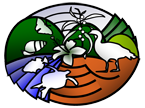 From the Chair
From the Chair
Thank you for your interest in the Ecology, Evolution and Conservation Biology graduate program.
The EECB program provides opportunities for students to integrate their studies across many of the traditional subdisciplines represented at UH. It is administered as a “specialization” within participating degree-granting graduate programs, such as Botany, Zoology, Anthropology, etc.
EECB is not a degree granting program.
Therefore, to be considered for admission to EECB, you must be enrolled in one of the participating degree granting graduate programs (Botany, Zoology, Anthroplogy, Marine Biology, etc.).
A student enrolled in the EECB program receives a Masters or Ph.D. degree from one of these degree granting programs, with a specialization in EECB.
Thus, the first step in applying to the EECB program is to contact a faculty member in one of the participating programs and who currently serves on the EECB faculty.
A list of EECB faculty members is available on this website. Once you have found an EECB faculty member whose interests overlap with your own and who can serve as your sponsor, they can guide you in submission of your application both to their program and to the EECB program.
Financial assistance is available for some EECB students in the form of research and/or teaching assistantships administered by the various departments and other research units at UH. You should discuss these possibilities directly with your sponsor.
EECB Program Admission Policy and Procedures
You must be accepted into a participating, degree-granting graduate program before your application to EECB will be considered. You cannot be admitted to EECB without also being in such a program.
For new students applying to UHM, application to the EECB program is available once you have been accepted to a participating degree-granting graduate program AND you have enrolled at the University. Your application to the program will be reviewed and, upon acceptance, you will be admitted to the program for the following semester. Application to EECB may be done during either Fall or Spring semester (see below).
Links
Application Deadline
The EECB program deadline is February 1 for admission the following fall semester and October 15 for admission the following spring semester (or, if either of these dates falls on a weekend or holiday, the deadline is the following Monday or the day after the holiday).
Application Requirements
The following two documents must be sent by e-mail directly to the EECB chair, Dr. Bob Thomson (thomsonr@hawaii.edu):
- Letter of interest in EECB
A statement expressing interest in EECB (up to 3 pages), including, at a minimum
- Information on past academic experience
- Goals for graduate study in general and graduate study in EECB in particular
- What you feel you can contribute to EECB
- What you expect to gain by participation in EECB
Include at the start of your statement: 1) your University of Hawaii student ID number, 2) the name of your advisor, 3) the name of your EECB faculty sponsor (see below) if different from your advisor, 4) your home department, 5) your home graduate program if different from home department, e.g., Zoology program in the School of Life Sciences, Entomology program in the PEPS Department, 6) degree you are seeking at present.
- Letter of support from an EECB faculty sponsor
Your sponsor must be a member of the EECB graduate faculty. Ordinarily the sponsor would be or would become your graduate advisor/committee chair, or serve as a committee member if the graduate advisor is not a member of the EECB graduate faculty. Exceptions to this policy will be considered on a case-by-case basis.
Evaluation of Applications
The EECB program seeks to encourage and support excellence in graduate studies in the biological sciences at UHM. Admission to EECB is therefore based on evaluation by the EECB admissions committee of the content and writing style of the applicant’s statement of interest and of the content of the faculty sponsor’s letter of support.
This page last modified 2 October 2020 by Rob Cowie
